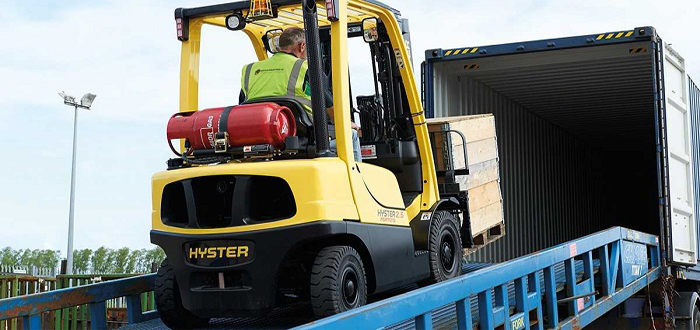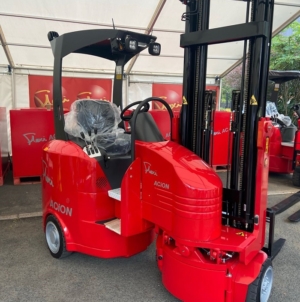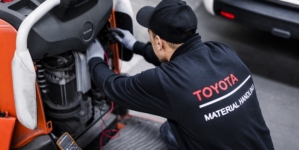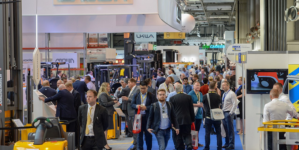-
Nutrivend selects Forterro’s Orderwise to support online expansion and streamline operations - April 11, 2025
-
ARROWXL LAUNCHES AMBITIOUS ZERO WASTE ROADMAP - April 8, 2025
-
THE BCMPA’S NEW CAMPAIGN DRIVES OUTSOURCING SUCCESS IN Q1 - April 7, 2025
-
BLACKOUT TECHNOLOGIES TARGETS TELEMATICS-INTEGRATED MOBILE DEVICE BLOCKING TO COMBAT SMARTPHONE DISTRACTION - April 1, 2025
-
Sparck Technologies awarded Royal designation - March 27, 2025
-
OpenADR Alliance announces first OpenADR 3.0 certified products with EVoke Systems, E.ON Energy and Universal Devices - March 25, 2025
-
Growing fulfilment and contract packer appoints new Managing Director - March 25, 2025
-
When is it time to invest in a WMS? Understanding the key trigger points - March 25, 2025
-
eCapital helps Vantage Recruitment on its journey to financial success - March 24, 2025
-
Hugo Beck Celebrates 70 Years of Packaging Innovation with Open House Events - March 20, 2025
HYSTER ® OFFERS LITHIUM-ION BATTERY OPTIONS FOR COUNTERBALANCE AND WAREHOUSE TRUCKS
The industrial truck brand Hyster® now offers almost all counterbalance lift trucks and warehouse equipment ex works, with lithium-ion batteries. At the LogiMAT trade fair for intralogistics in Stuttgart, the company presented the Hyster® J1.6XN three-wheel electric counterbalance truck with a 48-volt lithium-ion battery, which requires minimal maintenance.
“Lithium-ion battery-powered trucks are increasingly being used as the power option for demanding applications,” said Timo Antony, Area Business Director Central Europe, Hyster.
Since lithium-ion batteries do not contain acid that could leak and generate fumes, they are particularly suitable for intensive indoor applications, and are often the best solution in areas where contamination must be avoided, such as in the food industry. Lead-acid batteries, on the other hand, can release hydrogen and other gases that are undesirable in the cleanroom areas for food production and storage.
In addition, the maintenance requirements for lithium-ion batteries are not as labour intensive as for lead-acid batteries. This helps reduce costs, increase reliability and improve battery life as scheduled battery maintenance can also help prevent failures and downtime.
Recharging saves second battery
“One major benefit of lithium-ion batteries is the ability to charge them during scheduled breaks,” says Antony. “This ‘opportunity charging’ approach simplifies operations by requiring only one battery instead of two.” In addition, lithium-ion batteries are often more cost-effective when used properly and, after a few years, lower the total cost of the batteries.
With good availability and affordable pricing, lithium-ion battery power options are expected to be used in more and more applications. This option is particularly attractive for new locations, as a dedicated charging area is not required, saving space.
At older sites, it may be necessary to adjust the cabling to meet the increased power needs and capacity, because lead-acid batteries charge slowly over a longer period of time, while lithium-ion batteries charge quickly and require more energy. The infrastructure redesign requirement could be costly.
Hyster develops container handler with fuel cell
At the Greenport Congress in Valencia last October, Hyster presented an emission-free laden container handler with fuel cell technology, which is currently under development. The innovative electric lift truck has been developed for a customer in the port of Los Angeles and facilitates wireless fast charging. Patented Hyster® Energy Recovery Systems can increase truck uptime and profitability while lowering energy costs.
Hyster® Fuel Cell receives CE mark
In the US, the first Fuel Cell Lift Trucks are already being used by an automotive business and winery, and in Europe, the Hyster® Fuel Cell Counterbalanced Truck has been awarded CE marking. “We continue to develop the fuel cell products, focusing on the very active market in America and preparing for production in Europe,” says Antony. “Given the environmental challenges, we believe that fuel cells are the best option for some applications. However, it is currently estimated that less than 500 fuel cell powered lift trucks are operating across Europe at present.” For most applications, fossil fuels and batteries will continue to prevail – at least for the next five years. Li-ion batteries will achieve a higher share in the short term.
Why lead acid batteries are still the best solution for many
Electric forklift trucks with lead-acid batteries are still often the best choice for logistics operations, for example in pallet logistics. The companies benefit from efficiency and performance comparable to LPG and diesel forklift trucks. In multi-shift applications, operating costs can be reduced by changing the batteries between shifts.
However, the trucks would need a dedicated area for battery charging, and to avoid downtime, accurate battery charging needs to be defined including planned weekly maintenance and equalisation charging.
Why LPG forklifts are a popular choice
In the beverage industry, lift trucks are generally used for several purposes, for example, the handling of products from the bottling plant or within the warehouse and for transportation. The lift trucks must be flexible and available at all times during long hectic shifts, especially during the high summer demand. Such labour-intensive operations, where there may be fleets of ten to twelve lift trucks, cannot afford the downtime required to recharge batteries.
Here LPG forklifts are particularly well suited. Due to the high energy content of each gas cylinder, the truck operates at full power throughout the shift until the bottle is empty. The bottle can be changed in just a few minutes. Batteries, on the other hand, must be changed or charged after strict procedures and require space for corresponding charging areas.
For sectors such as the beverage industry, LPG is also a “clean” fuel with low emissions of soot or particulate matter, making it suitable for indoor use and trailers. LPG gas has the advantage of not being affected by warm temperatures, unlike batteries, that get hot and lose power during the intense summer time and high temperatures within buildings.
Where diesel lift trucks are an advantage
The diesel trucks in the Hyster Fortens™ series are particularly suited to intensive applications and demanding environments such as those encountered in the building materials sector or handling of metal products.
These trucks are ideal for tough operations thanks to their intelligent design and durable components. A reliable transmission protects the lift trucks from any major damage when operating in intense 24/7 applications. The Hyster® DuraMatch™ transmission option on the FT series is electronically controlled and protected and supports the most intense 2-3 shift operations, seven days a week.
When the accelerator pedal is released, the DuraMatch™ transmission automatically reduces the truck’s speed, helping to protect the powertrain and reduce tyre and brake wear, while offering smooth direction change.
The Hyster® H2.0-3.5FT forklift truck range offers all-round benefits for efficiency, driver productivity and low cost of ownership to applications throughout the supply chain.
For more information, visit www.hyster.eu.
































